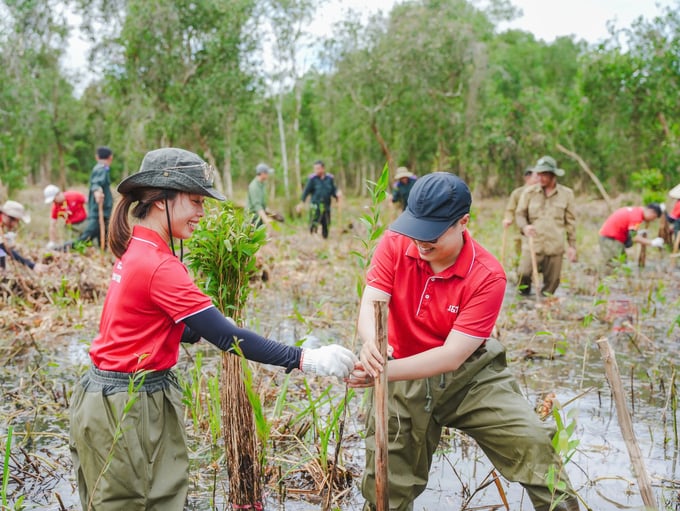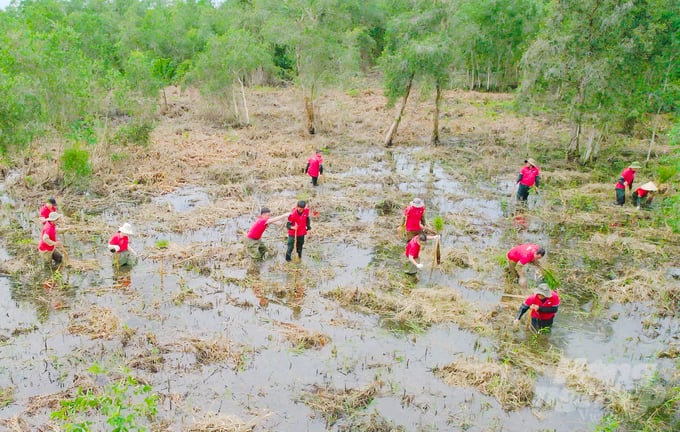December 18, 2025 | 00:14 GMT +7
December 18, 2025 | 00:14 GMT +7
Hotline: 0913.378.918
December 18, 2025 | 00:14 GMT +7
Hotline: 0913.378.918

Each newly planted native cajeput tree (Melaleuca cajuputi) represents J&T Express's collective effort to create green spaces aimed at sustainable development. Photo: Le Hoang Vu.
To align with the national goal of reducing greenhouse gas emissions and achieving net zero by 2050, while enhancing proactive capacity to address climate change, J&T Express recently collaborated with the Resource and Environment Communication Center (under the Ministry of Natural Resources and Environment) to launch the program "Shaping the Future - J&T Express Contributes to the Billion Trees Project" at U Minh Thuong National Park, Kien Giang Province.
This initiative is a meaningful contribution to the “Billion Trees Planting Project” approved by the Prime Minister, aiming toward the nation's long-term environmental goals.
In Phase 1, J&T Express planted 15,000 native cajeput trees (Melaleuca cajuputi), expanding 1 hectare of cajeput forest in the peat swamp area of U Minh Thuong National Park. The company will also collaborate with the Resource and Environment Communication Center to monitor and care for the newly planted forest for three years to ensure the trees grow and develop well.
Through this initiative, J&T Express aims to increase forest coverage, combat climate change and rising sea levels, restore the cajeput ecosystem on acidic peatlands in the Mekong Delta, and enhance the U Minh historical site. This effort will contribute to creating a "green lung" for Vietnam and cleaner air for the environment.
Mr. Đoàn Trường Giang, Deputy Director of the Resource and Environment Communication Center, emphasized:"There are many ways to address and adapt to climate change, and planting trees to protect the environment and safeguard unique ecosystems, such as at U Minh Thuong National Park, is essential. We highly value the cooperation of J&T Express and U Minh Thuong National Park in planting and expanding the cajeput forest, which helps restore and protect the peat swamp ecosystem amid the losses caused by climate change and past forest fires."
The native cajeput tree thrives in the acidic peat soil and weather conditions of U Minh Thuong National Park. It is resilient, prevents soil erosion, and absorbs CO2 more effectively than many other tree species.
According to the Ramsar Convention Secretariat, wetlands can absorb up to 55 times more CO2 than tropical forests. Specifically, cajeput trees can absorb between 200 tons/hectare (for trees under 10 years old) and 270 tons/hectare (for trees over 10 years old). Experts estimate that 1 hectare of newly planted cajeput forest could sequester 120 tons of CO2e within five years and 240 tons of CO2e within ten years. This estimate is based on studies of biomass, carbon sequestration, and CO2 absorption of plant species conducted by relevant centers.

The newly planted cajeput forest area supported by J&T Express at U Minh Thuong National Park. Photo: Le Hoang Vu.
Mr. Nguyen Anh Tuan, Strategy Director of J&T Express Vietnam, shared "J&T Express is always committed to bringing the best value to customers and the community through service quality and efforts to 'green' our business operations, demonstrating our social responsibility towards the country's and the environment's common issues."
In addition, J&T Express has organized meetings, visits, and gift-giving events for local residents and members of the Management Board who are carrying out the tasks of caring for and protecting U Minh Thuong National Park. These meaningful actions reflect the company's sense of responsibility and appreciation for the staff and residents working to nurture the green sprouts in the peat swamp forest in the farthest southwest region of the country.
U Minh Thuong National Park in Kien Giang Province was the first area on peatland in the region to become Vietnam's 5th ASEAN Heritage Park in 2012. Four years later, it was recognized as the 2,228th Ramsar site in the world and the 8th in Vietnam.
Translated by Kieu Chi

(VAN) Patrol Team No. 15 has been executing patrol, inspection, and control duties in the Southwest waters, a region identified as having a high risk of violations.

(VAN) UNICEF, IOM, and the U.S. Department of State have worked together to ensure the justice system becomes a protective shield for children and other vulnerable groups.

(VAN) As a key driving force of green transition, the circular economy is being identified as a strategic pillar of Viet Nam's new growth model.

(VAN) UNICEF and IOM receive this aid and provide essential services to assist families affected by recent storms and floods.

(VAN) Circular economy is regarded as a suitable pathway for Viet Nam’s fisheries sector, helping to improve production efficiency, optimize resources, and reduce environmental pressure.

(VAN) Vietnam and the UK are promoting cooperation in agriculture, environment, renewable energy, and green transition, with the goal of achieving Net Zero.

(VAN) Switzerland highly values carbon credit cooperation potential with Viet Nam and hopes to begin negotiations under Article 6 of the Paris Agreement.